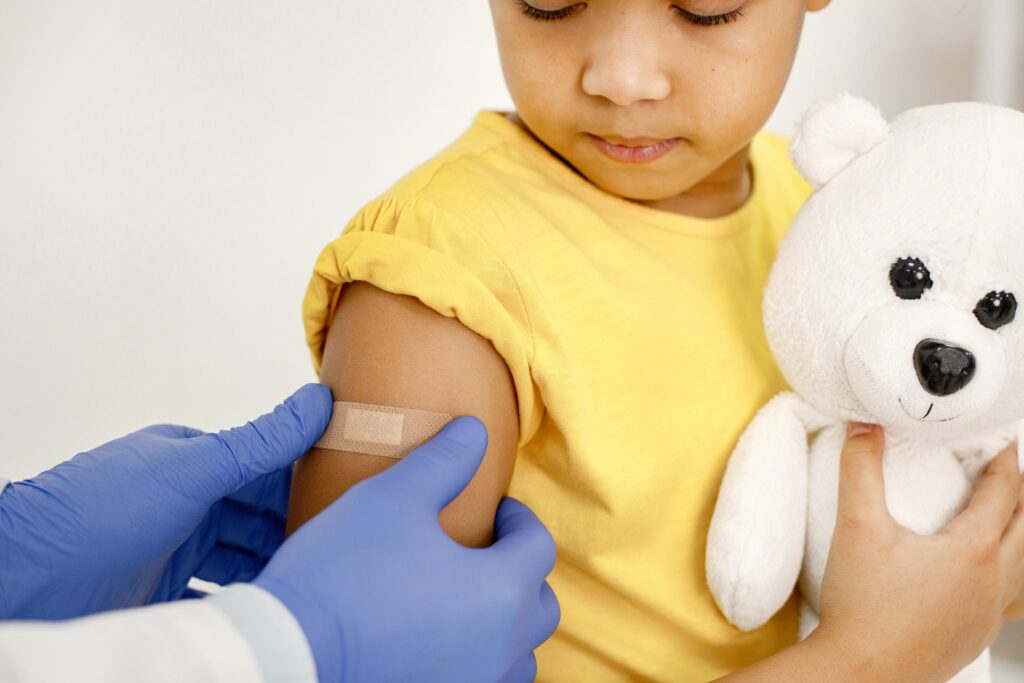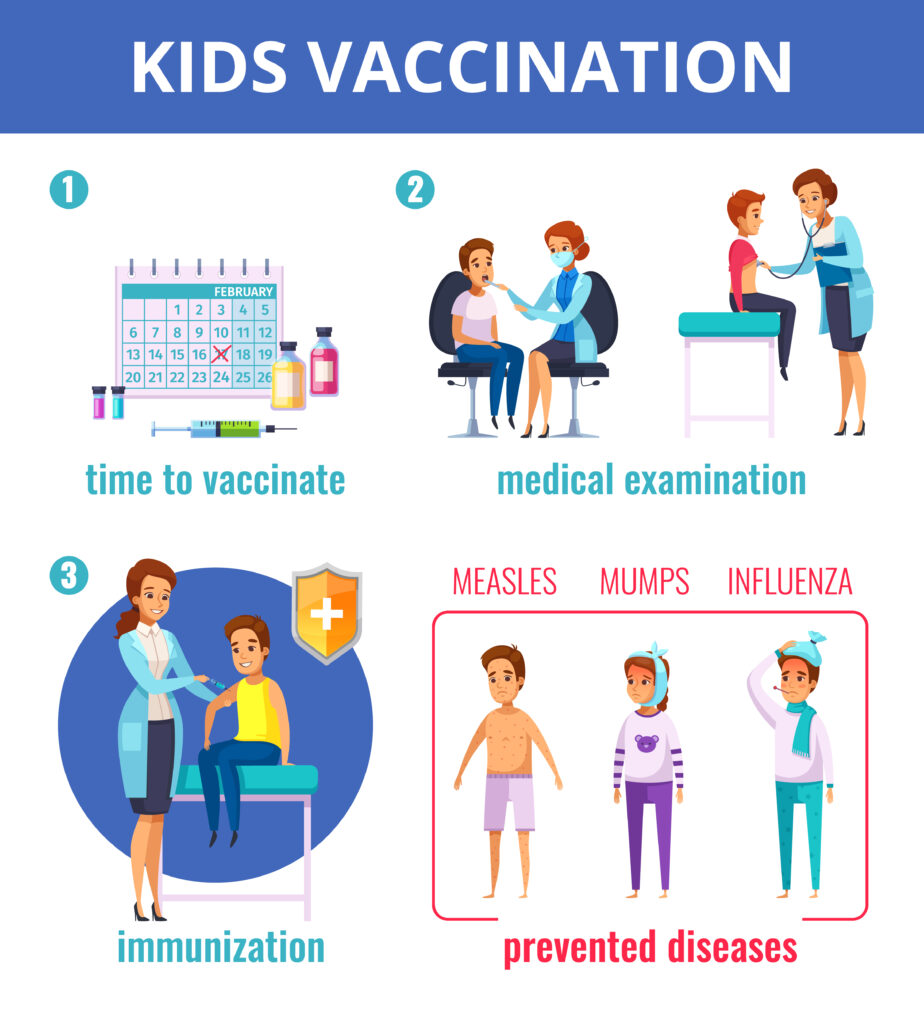
Table of Contents
What is immunization?
Vaccination and Immunization is a critical aspect of pediatric healthcare, offering numerous benefits that extend beyond individual protection. It prevents disease outbreaks, reduces healthcare costs, improves quality of life, and contributes to global health security. By vaccinating children, we not only protect them from immediate threats but also ensure a healthier future for generations to come. The importance of childhood immunization cannot be overstated, and continued efforts to promote and maintain high vaccination rates are essential for public health.
Why vaccination and immunization for children is crucial?
Detailed Key Benefits are explained below why immunizing our babies is critical:

1. Lifelong Protection from Early Onset
Vaccines provide critical early protection that can last a lifetime. Vaccinating children at an early age protects them from infections when they are most vulnerable. Diseases like measles, whooping cough, and polio can cause severe complications and even death in young children. Early immunization helps build a robust immune defense that can last into adulthood, reducing the incidence and severity of diseases later in life.
2. Prevention of Disease Outbreaks
Vaccination helps prevent disease outbreaks. High vaccination rates are essential for maintaining herd immunity, which ensures that even those who cannot be vaccinated, such as infants and immunocompromised children, are protected. Outbreaks of preventable diseases like measles can occur quickly in communities with low vaccination coverage, putting all children at risk.
3. Reduction in Healthcare Burden
Vaccinating children reduces the burden on healthcare systems. Preventable diseases can lead to significant healthcare costs due to hospitalizations, long-term treatments, and ongoing care for complications. By preventing these diseases through vaccination, healthcare systems can allocate resources more effectively and focus on other critical areas of pediatric care.
4. Improved Quality of Life
Vaccination improves the quality of life for children and their families. Preventable diseases can cause long-term health issues, such as hearing loss from mumps or paralysis from polio. By protecting children from these diseases, vaccines help ensure they can grow up healthy and lead full, active lives without the burden of chronic health problems.
5. Educational and Social Benefits
Vaccinated children are more likely to attend school regularly and participate in social activities. Diseases like chickenpox and the flu can lead to extended absences from school, disrupting a child’s education and social development. Vaccinated children are less likely to miss school due to illness, helping them stay on track academically and socially.
6. Protection for Future Generations
Vaccinating children helps protect future generations. By reducing the prevalence of infectious diseases today, vaccination efforts contribute to the goal of eradicating these diseases entirely. Diseases like smallpox have been eradicated through vaccination, and continued efforts could lead to the eradication of other diseases, ensuring that future generations are free from these threats.
7. Promotion of Global Health
Childhood vaccination contributes to global health security. Infectious diseases know no borders, and high vaccination rates are crucial for preventing the spread of diseases across countries and continents. International travel can quickly spread diseases, and maintaining high vaccination coverage helps protect children worldwide.
8. Scientific and Medical Advancements
The development and administration of vaccines drive scientific and medical advancements. Research into vaccines for children has led to better understanding of immunology, infectious diseases, and vaccine technology. This research not only improves existing vaccines but also leads to the development of new vaccines for emerging diseases, enhancing overall public health.
9. Economic Benefits
Vaccination provides significant economic benefits for families and society. Preventing diseases through vaccination reduces the need for medical treatments, hospital stays, and long-term care, which can be costly. Healthy children are more likely to attend school regularly and achieve better educational outcomes, leading to greater economic productivity in adulthood.
10. Ethical and Social Responsibility
Vaccinating children is an ethical obligation and a social responsibility. Immunizing children protects them and contributes to the health and safety of the entire community. By vaccinating their children, parents and guardians fulfill their responsibility to protect not only their own children but also those who cannot be vaccinated due to medical reasons.
Immunization/vaccination chart:
| CHILDREN AGE | VACCINATION |
| At Birth | BCG (Bacillus Calmette-Guérin) Hepatitis B: 1st dose OPV (Oral Polio Vaccine): 0 dose |
| 6 Weeks | DTP (Diphtheria, Tetanus, Pertussis): 1st dose IPV (Inactivated Poliovirus Vaccine): 1st dose Hepatitis B: 2nd dose Hib (Haemophilus influenzae type b): 1st dose Rotavirus: 1st dose PCV (Pneumococcal Conjugate Vaccine): 1st dose |
| 10 Weeks | DTP: 2nd dose IPV: 2nd dose Hib: 2nd dose Rotavirus: 2nd dose PCV: 2nd dose |
| 14 Weeks | DTP: 3rd dose IPV: 3rd dose Hib: 3rd dose Rotavirus: 3rd dose PCV: 3rd dose |
| 6 Months | Hepatitis B: 3rd dose |
| 6-9 Months | Influenza: Annual vaccination (first dose) |
| 9 Months to 12 Months | Measles-Rubella (MR): 1st dose |
| 12 Months | Hepatitis A: 1st dose |
| 15 Months | MMR (Measles, Mumps, Rubella): 1st dose Varicella: 1st dose PCV: Booster dose |
| 16-18 Months | DTP: 1st booster Hib: 1st booster IPV: 1st booster |
| 18-24 Months | Hepatitis A: 2nd dose |
| 2 Years | Typhoid Conjugate Vaccine (TCV): 1st dose (booster every 3 years) |
| 4-6 Years | DTP: 2nd booster OPV: 1st booster Varicella: 2nd dose MMR: 2nd dose |
| 10-12 Years | Tdap/Td (Tetanus, Diphtheria, Pertussis): 1 dose HPV (Human Papillomavirus Vaccine): 2 doses (6 months apart for girls) |
Additional Vaccines Based on Risk Factors
- Japanese Encephalitis (JE): In endemic areas, 2 doses starting from 9 months.
- Meningococcal Vaccine: For children with specific risk factors or during outbreaks.
- Cholera Vaccine: In outbreak situations or endemic areas.
Tips for Parents
- Maintain a Vaccination Record: Keep an up-to-date record of your child’s vaccinations.
- Consult Your Pediatrician: Follow the schedule recommended by your pediatrician, as they may adjust it based on your child’s health and risk factors.
- Stay Informed: Be aware of the vaccination schedule and any updates or new vaccine recommendations from health authorities.
Vaccination is a crucial part of ensuring your child’s health and preventing the spread of infectious diseases. Adhering to the recommended immunization schedule helps protect children from a wide range of serious diseases, contributing to their overall well-being and the health of the community. Always consult with healthcare providers for the most current and personalized vaccination advice.
